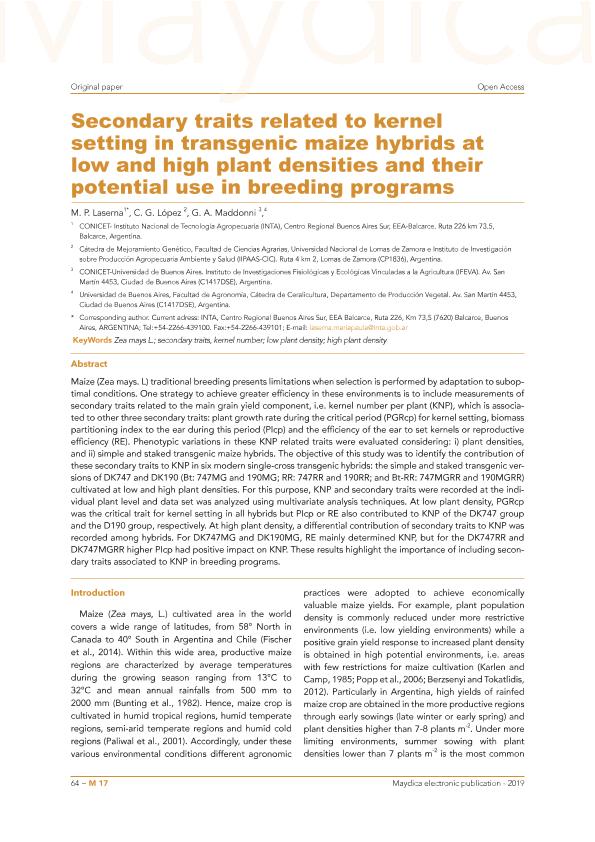Mostrar el registro sencillo del ítem
dc.contributor.author
Laserna, María Paula

dc.contributor.author
Lopez, C. G.
dc.contributor.author
Maddonni, Gustavo Angel

dc.date.available
2022-09-12T03:31:09Z
dc.date.issued
2019-12
dc.identifier.citation
Laserna, María Paula; Lopez, C. G.; Maddonni, Gustavo Angel; Secondary traits related to kernel setting in transgenic maize hybrids at low and high plant densities and their potential use in breeding programs; Maydica-ist Sper Cerealicoltur; Maydica; 64; 2; 12-2019; 1-12
dc.identifier.issn
0025-6153
dc.identifier.uri
http://hdl.handle.net/11336/168238
dc.description.abstract
Maize (Zea mays. L) traditional breeding presents limitations when selection is performed by adaptation to suboptimal conditions. One strategy to achieve greater efficiency in these environments is to include measurements of secondary traits related to the main grain yield component, i.e. kernel number per plant (KNP), which is associated to other three secondary traits: plant growth rate during the critical period (PGRcp) for kernel setting, biomass partitioning index to the ear during this period (PIcp) and the efficiency of the ear to set kernels or reproductive efficiency (RE). Phenotypic variations in these KNP related traits were evaluated considering: i) plant densities, and ii) simple and staked transgenic maize hybrids. The objective of this study was to identify the contribution of these secondary traits to KNP in six modern single-cross transgenic hybrids: the simple and staked transgenic versions of DK747 and DK190 (Bt: 747MG and 190MG; RR: 747RR and 190RR; and Bt-RR: 747MGRR and 190MGRR) cultivated at low and high plant densities. For this purpose, KNP and secondary traits were recorded at the individual plant level and data set was analyzed using multivariate analysis techniques. At low plant density, PGRcp was the critical trait for kernel setting in all hybrids but PIcp or RE also contributed to KNP of the DK747 group and the D190 group, respectively. At high plant density, a differential contribution of secondary traits to KNP was recorded among hybrids. For DK747MG and DK190MG, RE mainly determined KNP, but for the DK747RR and DK747MGRR higher PIcp had positive impact on KNP. These results highlight the importance of including secondary traits associated to KNP in breeding programs.
dc.format
application/pdf
dc.language.iso
eng
dc.publisher
Maydica-ist Sper Cerealicoltur

dc.rights
info:eu-repo/semantics/openAccess
dc.rights.uri
https://creativecommons.org/licenses/by-nc-sa/2.5/ar/
dc.subject
MAIZE
dc.subject
SECONDARY TRAITS
dc.subject
KERNEL SETTING
dc.subject
PLANT DENSITY
dc.subject.classification
Agricultura

dc.subject.classification
Agricultura, Silvicultura y Pesca

dc.subject.classification
CIENCIAS AGRÍCOLAS

dc.title
Secondary traits related to kernel setting in transgenic maize hybrids at low and high plant densities and their potential use in breeding programs
dc.type
info:eu-repo/semantics/article
dc.type
info:ar-repo/semantics/artículo
dc.type
info:eu-repo/semantics/publishedVersion
dc.date.updated
2020-12-15T14:15:52Z
dc.identifier.eissn
2279-8013
dc.journal.volume
64
dc.journal.number
2
dc.journal.pagination
1-12
dc.journal.pais
Italia

dc.journal.ciudad
Bergamo
dc.description.fil
Fil: Laserna, María Paula. Consejo Nacional de Investigaciones Científicas y Técnicas. Centro Científico Tecnológico Conicet - Mar del Plata. Instituto de Innovación para la Producción Agropecuaria y el Desarrollo Sostenible - Instituto Nacional de Tecnología Agropecuaria. Centro Regional Buenos Aires Sur. Estación Experimental Agropecuaria Balcarce. Instituto de Innovación para la Producción Agropecuaria y el Desarrollo Sostenible; Argentina
dc.description.fil
Fil: Lopez, C. G.. Universidad Nacional de Lomas de Zamora. Facultad de Ciencias Agrarias. Instituto de Investigación en Producción Agropecuaria Ambiente y Salud. - Comisión de Investigaciones Científicas de la Provincia de Buenos Aires. Instituto de Investigación en Producción Agropecuaria Ambiente y Salud; Argentina
dc.description.fil
Fil: Maddonni, Gustavo Angel. Universidad de Buenos Aires. Facultad de Agronomía. Departamento de Producción Vegetal; Argentina. Consejo Nacional de Investigaciones Científicas y Técnicas. Oficina de Coordinación Administrativa Parque Centenario. Instituto de Investigaciones Fisiológicas y Ecológicas Vinculadas a la Agricultura. Universidad de Buenos Aires. Facultad de Agronomía. Instituto de Investigaciones Fisiológicas y Ecológicas Vinculadas a la Agricultura; Argentina
dc.journal.title
Maydica

dc.relation.alternativeid
info:eu-repo/semantics/altIdentifier/url/https://journals-crea.4science.it/index.php/maydica/article/view/1928
Archivos asociados
